Life on the Farm
First off, the setting...
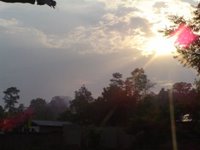
Once upon a time, far, far away in the beautiful mountains and thick forests of the Eastern Region of Ghana...



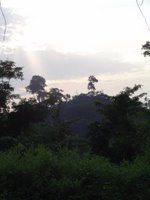
There was a small village called Nkwanta, with only a couple hundred inhabitants. This story takes place in the compound of Mr. Mensah, a cocoa farmer.
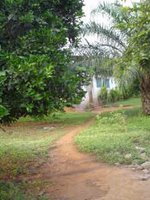
The CAST
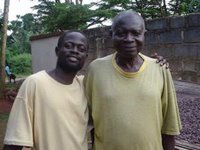 Mr. Mensah himself, accompanied by Mustapha
Mr. Mensah himself, accompanied by Mustapha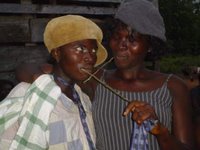 Mr. Mensah's daughters, Ama and Efia, who like to put on variety shows dressed as old men...
Mr. Mensah's daughters, Ama and Efia, who like to put on variety shows dressed as old men...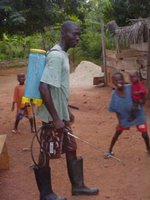 A son, Ebenezer, who's a ghostbuster in his free time...
A son, Ebenezer, who's a ghostbuster in his free time... His wife, hugged by Mustapha.
His wife, hugged by Mustapha. Another son, David, who is consistantly drunk and the butt of most of the family jokes. He insists on my undivided attention when drunk, so Mus is often trying to distract him by being silly.
Another son, David, who is consistantly drunk and the butt of most of the family jokes. He insists on my undivided attention when drunk, so Mus is often trying to distract him by being silly.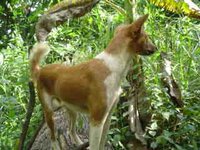 And the dog, who's Twi name I couldn't pronounce but the name meant "Do Your Best." Which he does. Man, does this dog earn his keep. His jobs include- chasing off strange goats and sheep from the land (but he knows all of the sheep and goats that belong in the compound and keep them herded together); bringing home any game he catches in the woods and lying it at his master's feet, who then cooks it for supper; and, on command, catching one of the many chickens kept in the yard and delivering it to his master to be slaughtered.
And the dog, who's Twi name I couldn't pronounce but the name meant "Do Your Best." Which he does. Man, does this dog earn his keep. His jobs include- chasing off strange goats and sheep from the land (but he knows all of the sheep and goats that belong in the compound and keep them herded together); bringing home any game he catches in the woods and lying it at his master's feet, who then cooks it for supper; and, on command, catching one of the many chickens kept in the yard and delivering it to his master to be slaughtered.Additionally, there are teachers and tons of kids living in the compound, bringing the total number of people living there up to 22.
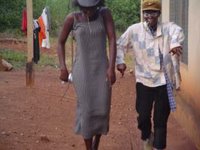 Now since it was a very small village, there wasn't a whole lot of entertainment around. Our compound didn't even have electrcity. So my favorite variety of entertainment was the variety shows Ama and Efia would put on for us. In fact, they greeted us with an impromptu rap, and later treated us to a rendition of a Hiplife song, "The Old Man Boogie" complete with costumes.
Now since it was a very small village, there wasn't a whole lot of entertainment around. Our compound didn't even have electrcity. So my favorite variety of entertainment was the variety shows Ama and Efia would put on for us. In fact, they greeted us with an impromptu rap, and later treated us to a rendition of a Hiplife song, "The Old Man Boogie" complete with costumes.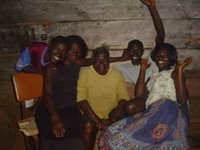
 Here we all are, hanging out around the fire in the evenings, watching the skits put on by Ama and Efia, or singing songs and telling stories (and in the chilly mountain air, the fire actually felt good!)
Here we all are, hanging out around the fire in the evenings, watching the skits put on by Ama and Efia, or singing songs and telling stories (and in the chilly mountain air, the fire actually felt good!)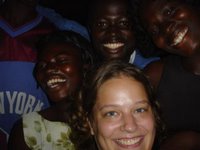 Everyone else's favorite form of entertainment, however, seemed to be my camera. This is me, Mus, Ama, Efia, and Ebenezer (who's head didn't make it in the photo).
Everyone else's favorite form of entertainment, however, seemed to be my camera. This is me, Mus, Ama, Efia, and Ebenezer (who's head didn't make it in the photo).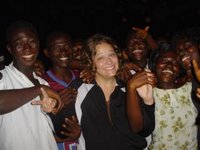 Once we took one photo, a whole huge group of people I didn't know crowded around for the next one. In Cape Coast, teenagers could care less about their photo, unless their your friends. But little kids will rush to jump in front of the camera. In Nkwanta, teenagers will rush in front of your camera...
Once we took one photo, a whole huge group of people I didn't know crowded around for the next one. In Cape Coast, teenagers could care less about their photo, unless their your friends. But little kids will rush to jump in front of the camera. In Nkwanta, teenagers will rush in front of your camera... And the kids will actually yell "Hooray!" after you take thier photo. I don't exagerate. See, taking the picture itself doesn't excite the kids, it's the flash. Once the flash goes off, the kids jump and yell as if I'd told them they're getting an extra week of Christmas vacation.
And the kids will actually yell "Hooray!" after you take thier photo. I don't exagerate. See, taking the picture itself doesn't excite the kids, it's the flash. Once the flash goes off, the kids jump and yell as if I'd told them they're getting an extra week of Christmas vacation.My other favorite past time was going out to the farm. Everyone in the family has a piece of land that they farm and are responsible for- these little patches grow food crops like corn, different tubers, peppers, tomatoes, etc...
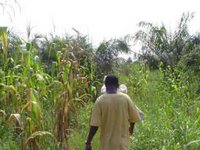 Here we are, walking by small of the smaller plots of land in order to get to the cocoa trees... You can see how the farms don't resemble our straight rows... These look like they are fully integrated into their natural surroundings.
Here we are, walking by small of the smaller plots of land in order to get to the cocoa trees... You can see how the farms don't resemble our straight rows... These look like they are fully integrated into their natural surroundings.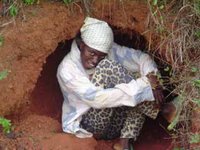 Here's Ama, all dressed up and ready to go the farm.
Here's Ama, all dressed up and ready to go the farm.Some sights seen in the farm....

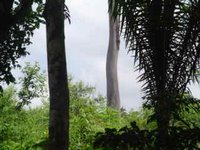
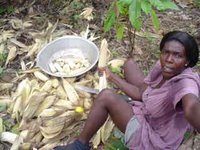 This is Christiana, Ama and Efia's sister, working her piece fo the farm.
This is Christiana, Ama and Efia's sister, working her piece fo the farm.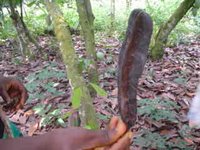 This is a vegetable that is cooked in soups that is used to prevent and control diabetes. It's called Prekese.
This is a vegetable that is cooked in soups that is used to prevent and control diabetes. It's called Prekese.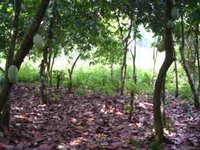 This is a grove of cocoa trees- we sat in the cool shade for awhile.
This is a grove of cocoa trees- we sat in the cool shade for awhile.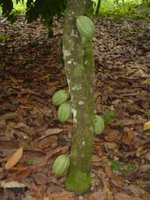 Here's a cocoa tree- the fruit actually grows straight from the trunk!
Here's a cocoa tree- the fruit actually grows straight from the trunk!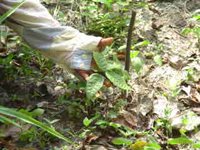 This cocoa tree is just a baby. In five years, though, it'll look like this:
This cocoa tree is just a baby. In five years, though, it'll look like this:
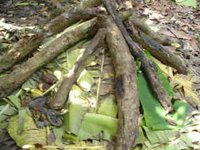 Once the fruits are picked, they are piled into a heap and covered with plantain leaves to ferment. They are left there for about a week, and this takes place right on the farm where they're picked.
Once the fruits are picked, they are piled into a heap and covered with plantain leaves to ferment. They are left there for about a week, and this takes place right on the farm where they're picked.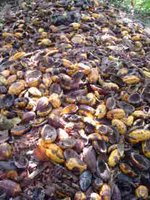 Then they open the fruits to harvest the seeds or beans. The fruits are left on the farm in a compost heap.
Then they open the fruits to harvest the seeds or beans. The fruits are left on the farm in a compost heap.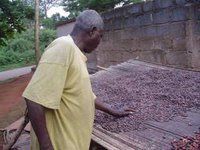 The beans are taken home and laid out on drying mats.
The beans are taken home and laid out on drying mats.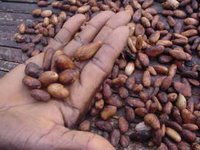
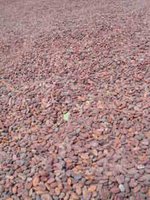
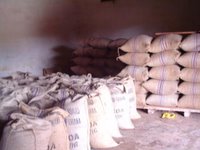 Then the dry beans are bagged and taken to the weighing station, where the farmer is paid by the government at a set price. The bags wait in the station until a government truck comes to take them away.
Then the dry beans are bagged and taken to the weighing station, where the farmer is paid by the government at a set price. The bags wait in the station until a government truck comes to take them away.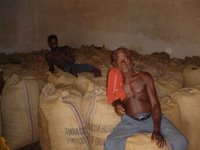
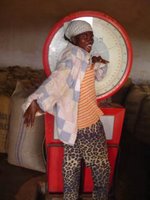 Here Ama is getting weighed, to see how much the Ghanaian government will pay for her.
Here Ama is getting weighed, to see how much the Ghanaian government will pay for her.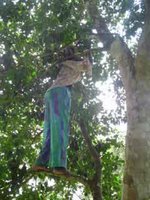 After walking around in the heat for awhile, Efia decided we needed some oranges to refresh us, so she climbed up in the tree to pick some.
After walking around in the heat for awhile, Efia decided we needed some oranges to refresh us, so she climbed up in the tree to pick some.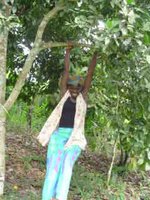 Now because these oranges have never had any fertilizer added to them- they are natural trees that have grown on their own- the oranges are much smaller than other oranges and sooo sweet! I've never tasted an orange so sweet. They say that the oranges are changed over time with fertilizer, and will only produce larger, less sweet fruits.
Now because these oranges have never had any fertilizer added to them- they are natural trees that have grown on their own- the oranges are much smaller than other oranges and sooo sweet! I've never tasted an orange so sweet. They say that the oranges are changed over time with fertilizer, and will only produce larger, less sweet fruits. For the long walk home, I'd forgotten my umbrella. In Ghana, if I walk outside midday, I always carry an umbrella as a parasol for some much-needed shade. Since I'd forgotten my umbrella that day, they fashioned me a disposable umbrella from a plantain leaf. The farmers really use these for umbrellas when it rains.
For the long walk home, I'd forgotten my umbrella. In Ghana, if I walk outside midday, I always carry an umbrella as a parasol for some much-needed shade. Since I'd forgotten my umbrella that day, they fashioned me a disposable umbrella from a plantain leaf. The farmers really use these for umbrellas when it rains.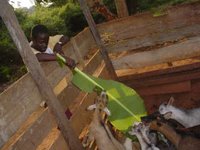 Here's Mus, disposing of the umbrella.
Here's Mus, disposing of the umbrella.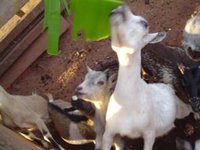
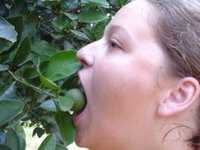 But my favorite part of the trip was the fruit, so fresh you could eat it right off the tree. Here I am munching off an orange tree they named after me (because I ate so many oranges!)
But my favorite part of the trip was the fruit, so fresh you could eat it right off the tree. Here I am munching off an orange tree they named after me (because I ate so many oranges!)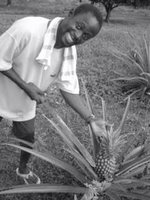 Here's Mus with a pineapple plant. These also look funny, because the plant grows the pineapple at the very top, with the stalk holding up this one heavy fruit. It's like the plant is offering the fruit to you, holding it up and begging you to take it.
Here's Mus with a pineapple plant. These also look funny, because the plant grows the pineapple at the very top, with the stalk holding up this one heavy fruit. It's like the plant is offering the fruit to you, holding it up and begging you to take it.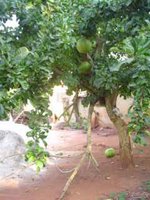 Speaking of fruit, this tree produces these giant melon type fruits, that they dry out and use to carry water.
Speaking of fruit, this tree produces these giant melon type fruits, that they dry out and use to carry water.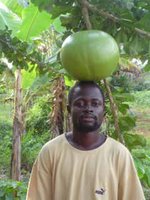 Look at how big this is to grow on a tree!
Look at how big this is to grow on a tree!And lastly, I learned how to make palm wine. They tap the sap from a palm tree and then bring it to a distillery, such as this operation...
 All the sap starts in this barrel, and the evaporated liquid is transported through the pipe to...
All the sap starts in this barrel, and the evaporated liquid is transported through the pipe to...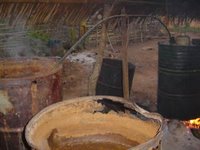 The next barrel, where it cool and condenses again. It sits there for a while, fermenting...
The next barrel, where it cool and condenses again. It sits there for a while, fermenting...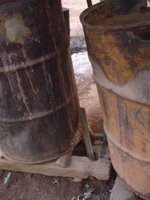 And then travels through a pipe through the next barrel...
And then travels through a pipe through the next barrel...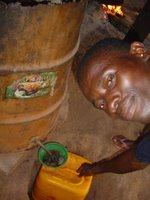 And then out a tap into a big jug, to be sold! No fancy labels for this moonshine- it's more of a bring your own bottle type of operation.
And then out a tap into a big jug, to be sold! No fancy labels for this moonshine- it's more of a bring your own bottle type of operation.